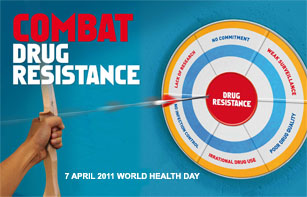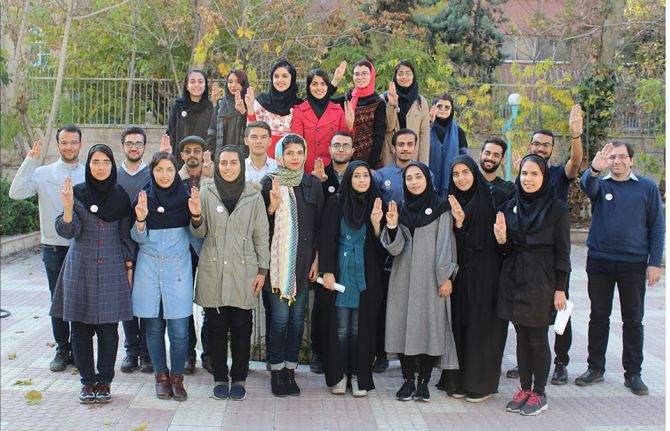
Feature Story
World Health Day 2011: Urgent action necessary to slow down the spread of drug resistance
07 April 2011
07 April 2011 07 April 2011A version of this story also appears at who.int

Credit: WHO
Drug resistance is becoming more severe and many infections are no longer easily cured, leading to prolonged and expensive treatment and greater risk of death, warns the World Health Organization (WHO) on World Health Day, 7 April 2011.
Under the theme "combat drug resistance", WHO calls for urgent and concerted action by governments, health professionals, industry, civil society and patients to slow down the spread of drug resistance, limiting its impact today and preserving medical advances for future generations.
Drug resistance is a natural process in which microorganisms acquire resistance to the drugs meant to kill them. With each new generation, the microorganism carrying the resistant gene becomes ever more dominant until the drug is completely ineffective. Inappropriate use of infection-fighting drugs (underuse, overuse or misuse) causes resistance to emerge more quickly.
On the brink of losing miracle cures
The trends are clear and ominous. No action today means no cure tomorrow
WHO Director-General Dr Margaret Chan
“The message on this World Health Day is loud and clear. The world is on the brink of losing these miracle cures,” said WHO Director-General Dr Margaret Chan. She added, “The trends are clear and ominous. No action today means no cure tomorrow.”
Measures to combat drug resistance
WHO has published a policy package that sets out the measures governments and their national partners need to combat drug resistance. These include:
- Develop and implement a comprehensive, financed national plan
- Strengthen surveillance and laboratory capacity
- Ensure uninterrupted access to essential medicines of assured quality
- Regulate and promote rational use of medicines
- Enhance infection prevention and control
- Foster innovation and research and development for new tools.
Resistance detected in a number of diseases
According to latest WHO figures, at least 440 000 of new cases of multidrug resistant-tuberculosis (MDR-TB) emerge each year, and by the end of 2010, 69 countries had reported extensively drug-resistant tuberculosis (XDR-TB). Resistance is also emerging to the antiretroviral drugs used to treat people living with HIV.
Getting everyone on the right track
Dr Mario Raviglione, Director of WHO Stop TB Department, who has been leading the preparations for World Health Day 2011, called for measures against drug resistance to be strengthened and implemented urgently. He added, “New collaborations, led by governments working alongside civil society and health professionals, if accountable, can halt the public health threat of drug resistance."



